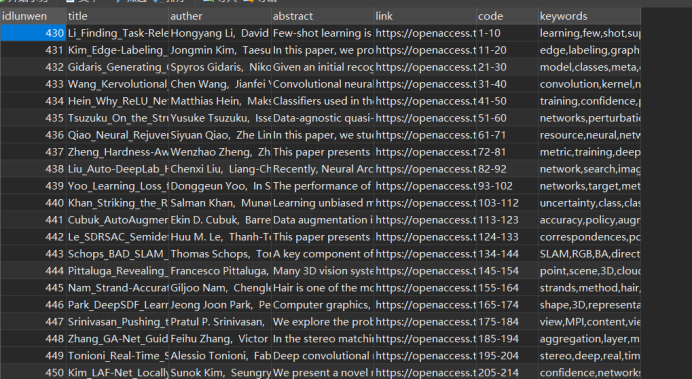import requests
import jieba
import pymysql
from bs4 import BeautifulSoup
#链接到本地数据库
from jieba.analyse import extract_tags
db = pymysql.connect(host='127.0.0.1',port=3306,user='root',password='1224',database='cvpr',charset='utf8')
cursor = db.cursor()
#定义头文件
headers={
"User-Agent":"Mozilla/5.0 (Windows NT 10.0; WOW64) AppleWebKit/537.36 (KHTML, like Gecko) Chrome/74.0.3729.169 Safari/537.36"
}
#get方法抓取数据
# url="http://openaccess.thecvf.com/CVPR2019.py"
url="https://openaccess.thecvf.com/CVPR2019?day=2019-06-18"
html=requests.get(url)
#使用 Beautiful Soup 解析网页
soup=BeautifulSoup(html.content,'html.parser')
pdfs=soup.findAll("a",text="pdf")
print(len(pdfs))
lis = []
jianjie=""
for i,pdf in enumerate(pdfs):
pdf_name=pdf["href"].split('/')[-1]
name=pdf_name.split('.')[0].replace("_CVPR_2019_paper","")
link="http://openaccess.thecvf.com/content_CVPR_2019/html/"+name+"_CVPR_2019_paper.html"
url1=link
print(url1)
print(i)
html1 = requests.get(url1)
if html1:
soup1 = BeautifulSoup(html1.content, 'html.parser')
weizhi = soup1.find('div', attrs={'id':'abstract'})
if weizhi:
jianjie =weizhi.get_text()
authers = soup1.find_all(id="authors")
# 论文编号
a = authers[0].contents[3]
a_split = a.split('.')#以点分割为数组
code=a_split[1].strip()#去掉空格前后
# 作者
auther = soup1.find("i")
myauther=auther.string
keywordlist=[]
for keyword, weight in extract_tags(jianjie.strip(), topK=5, withWeight=True):
keywordlist.append(keyword)
keywordliststr = ','.join(keywordlist)
info = {'title': name, 'author': myauther, 'abstract': jianjie, 'link': link, 'code': code,
'keywords': keywordliststr}
print(info.values())
lis.append(info)
print(lis)
cursor = db.cursor()
for i in range(len(lis)):
cols = ", ".join('`{}`'.format(k) for k in lis[i].keys())
print(cols) # '`name`, `age`'
val_cols = ', '.join('%({})s'.format(k) for k in lis[i].keys())
print(val_cols) # '%(name)s, %(age)s'
sql = "insert into lunwen(%s) values(%s)"
res_sql = sql % (cols, val_cols)
print(res_sql)
cursor.execute(res_sql, lis[i]) # 将字典a传入
db.commit()
print("ok")
![]()



 浙公网安备 33010602011771号
浙公网安备 33010602011771号